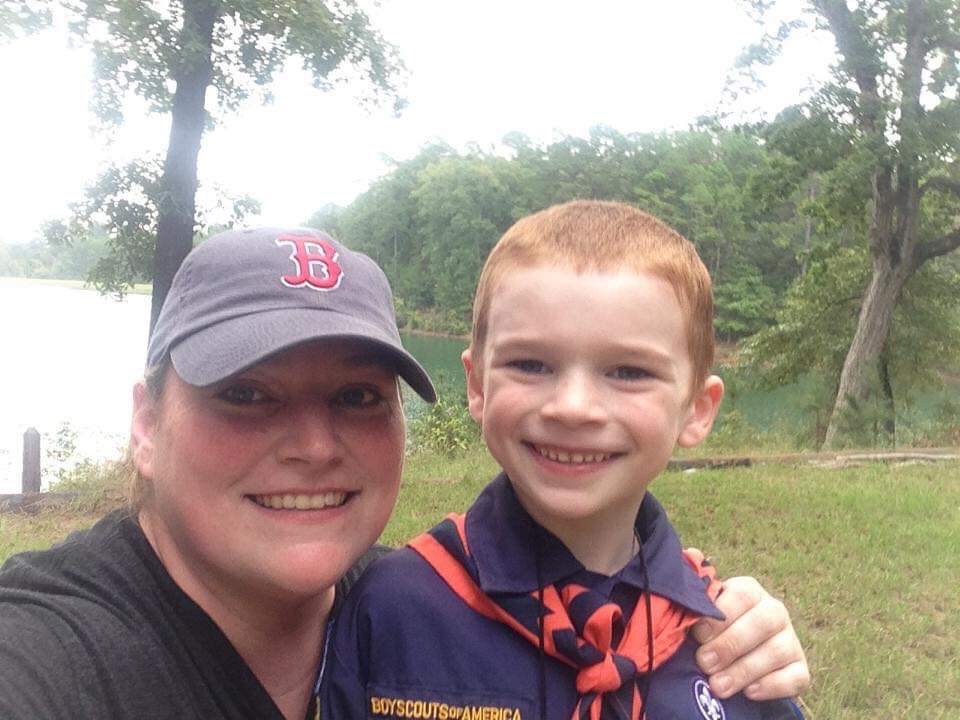The Turning Point
One day, Amber was at the park with Elijah’s physical therapist, her son, who has high functioning autism, and Garrison. As they were walking up a hill, Elijah and his friend were walking together while Garrison trailed behind walking by himself. He had a blade of grass that he was waving in front of his eyes and toe walking up this hill. He had no care for the other kids that were there. The physical therapist turned to Amber and said,
“Amber, you know Garrison is autistic, right?”
For Amber, it felt like someone had punched her in the stomach. This was the first time that someone used the “A word” out loud.
Having this conversation, along with Garrison’s suspensions from school, and having the conversation with her husband saying that Garrison needed to be evaluated, is what put everything into focus for Amber as a parent. As Amber said, “I realized that Garrison’s behavior is not an excuse for how he behaves, but having the label can give people a lens to understand and address it differently.”
Evaluation and Diagnosis
After deciding that Garrison was going to be evaluated for Autism, Amber wanted to ensure that Garrison had the best evaluation. Amber and her family found an excellent developmental pediatrician that conducted the evaluation. The whole process took about six months. Amber remembers sitting at the big conference table and hearing the results and diagnosis for Garrison. Once they got the label of autism, Amber felt security in the thoroughness of the evaluation. When the clinic said it was autism, it was autism.
Following the meeting, Amber and her husband loaded the kids in the car to drive home. Once Amber was in the car, she shared that she “just sobbed gut-wrenching sobs and let it out. Four to five years of denial…I just let it out. And it lasted all of 90 seconds. I had my little pity party..table of 1.” Once Amber was done crying, she felt okay. At that moment, she realized that she loved him just the same right now as the first time she had laid eyes on him.
Being diagnosed with autism didn’t make him any less. It didn’t make her love him any less.
From that day when Garrison was diagnosed, a switch was flipped, and Amber became an advocate for all things autism and Garrison.
What advice would you share with other parents with similar experiences?
Amber’s goal as a parent is to create happy, successful citizens of the world. As Amber shared with me,
“If your goal is that you want your child to be happy and successful, your definition of what is happy and successful may change. It’s not that you are letting go of that goal, it’s what is meaningful and relevant to them (your child).”
One thing that has helped Amber has been learning from adults on the spectrum. When the diagnosis was about a month old, Amber attended a conference for individuals with autism. It helped her understand Garrison more by listening and befriending adults on the spectrum.
Another thing that has helped is that Amber and Micah started teaching Garrison self-determination. Garrison was part of his Individual Education Plan (IEP) meetings starting in the first grade. Before the meeting, Amber and Garrison sit down together and write a portion of his IEP and Garrison shares what goals that he wants to work on. For his first IEP meeting, Garrison made a video and wore his Cub Scout uniform. Now, Garrison speaks at his IEP meetings. It’s still a little bit of struggle for him, but he speaks up for what he needs. Amber believes a key to Garrison’s success is empowering his voice to be heard. Garrison has made the most progress on the goals that were his ideas and not those of his special education teacher.







I love the idea of a parenting spot light. This article highlights a common experience for patents of children who have high functioning Autism. Denial is certainly part of the acceptance process for many. Thank you for sharing!